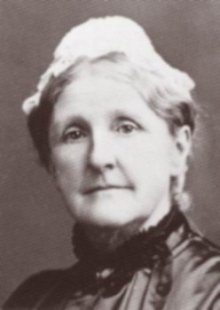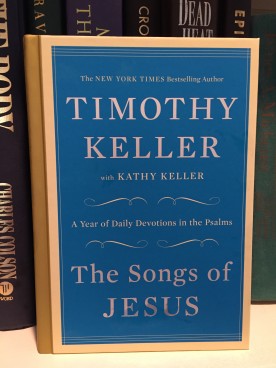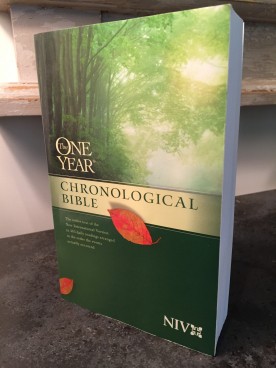It’s Valentine’s Weekend. Romance is in the air. But just because you fall in love doesn’t mean you will stay there. And if you think you’ve found the “perfect” person to spend your life with, maybe think again.
“The moment you marry someone,” writes Tim Keller, “you and your spouse begin to change in profound ways, and you can’t know ahead of time what those changes will be. So you don’t know, you can’t know, who your spouse will actually be in the future until you get there.”

You can’t know who your spouse will actually be in the future until you get there.
Robbie can vouch for the truth in those words. “College Jodie” (the woman he fell in love with) was very different from “career Jodie” (the woman he married three months after graduation). And when “wife Jodie” became “wife-and-mother Jodie,” she morphed yet again. (I won’t go into the details of each transformation, other than to say that “college Jodie” was way more fun than any of the subsequent models.)
All of which is a roundabout way of saying that if you’re on a quest to fall in love, to find a “soul mate” with whom you will be forever compatible, give it up. That person, says Keller, doesn’t exist.
Is Long-Lasting Love Doomed?
Does that mean true love is doomed? Once the flame of infatuation flickers out, does love – does marriage – have to get filed in the hum-drum cabinet? Is the secret to a stable and long-lasting relationship really, as someone once said, about finding that one special person you want to annoy for the rest of your life?
No! Not at all!
Because love is not, actually, about getting hooked on a feeling. Love – true, lasting, sizzling love – is about making a choice.
A deliberate decision.
Or, more to the point, a series of decisions, made day in and day out, over and over again.

Six years ago, in a column for The New York Times, writer Mandy Len Catron recounted a fascinating story about what it took to fall in love–in a bar, as an experiment–with a man that, until then, she’d only seen a few times in the gym. “Love didn’t happen to us,” she concluded. “We’re in love because we each made the choice to be.”
More recently, author Lisa Jacobson revealed the results of her own adventure in love-building. In the midst of what she acknowledges was a “difficult season in a very difficult year,” she made a conscious decision to love her husband every day. To choose to intentionally give love to, and fall in love with, the man she had married.
Making his coffee. Folding his shirts. Laughing at his jokes and trying to make him laugh in return.
For 100 days straight.
Lisa figured that her 100-day “Love Challenge” would make her man happy. And it did. What she didn’t count on, though, was the transformational impact it had on her. “The more I chose love,” she wrote, “the more loving – and loved – I felt.”
Creating an upward spiral of love
When I read Lisa’s post, I wasn’t surprised. I’ve written before in this space about how kindness is what glues couples together, and how generosity (even just bringing your spouse a cup of coffee in the morning) can create an upward spiral – a “virtuous cycle” – leading to happier, more satisfying relationships. I’ve read the research and seen this love-begets-love dynamic in action in my own marriage.
I know it works.
But if you’re reading this and you find yourself hard-pressed to give love, can I just say that I get that too? We’ve all felt deficient or ill-equipped at one time or another. People get tired, feelings get hurt, and it can seem like our love tanks have run dry. And even though we know it’s better to give than to receive, we might find ourselves holding back, wishing we didn’t have to go first.
If that’s where you are this Valentine’s Day, can I slip in beside you and offer three little thoughts?
First, love out of God’s riches, not your poverty.
Your love tank might show a reading of “empty.” But remember where love comes from. “We love, the Bible says, “because he first loved us.” And when we grasp, as Paul did, how “wide and long and high and deep” Christ’s love for us is, we get “filled to the measure of all the fullness of God.” Our love tanks get replenished. We don’t have to gin up feelings of love on our own; we can let God’s love fill us up and flow out.
Next, start small.
Showing love doesn’t have to involve a grand (or expensive) gesture. If you’re fresh out of ideas or inspiration of the simple-but-powerful sort, check out Lisa and Matt Jacobsons’ 100 Ways books (there’s a volume for loving your husband, and another for loving your wife)…

…or pick up the just-released Creative Love by Audrey and Jeremy Roloff, a book that comes with date-night ideas, conversation starters, and tips for navigating conflict with wisdom and grace.

And finally, pray.
Ask the Holy Spirit, your Helper, to show you how to love well.
And pray for your spouse – not that God would fix them, but that he would bless them. Because we can’t help it; when we bring someone before the Lord – asking God to protect them, give them grace, and pour good things into their lives – we get a vested interest in their well-being. The soil of our hearts starts to soften, giving love a chance to take root and grow.
Three “Fall in Love” prayers you can pray
So what should you pray for your spouse?
You’ll find about a dozen built-in prayer prompts in Psalm 112 (it’s a passage I turn to again and again), but if you want to copy three prayers I am praying over my man and our marriage this year, here they are:
May Robbie serve you with whole-hearted devotion and a willing mind; search his heart and understand his every desire and thought. (1 Chronicles 28:9)
May he take delight in you; give him the desires of his heart. (Psalm 37:4)
May our love increase and overflow for each other and everyone else. (1 Thessalonians 3:12)

❤️
P.S. I’ve linked the resources you’ll find in this blog – the Keller book, the 100 Ways bundle, and Creative Love – via Amazon, and I get a tiny commission if you order from this post, but the books are available anywhere books are sold, so please: Support your favorite local bookshop if you can. (Heads up, tho: Amazon has Keller’s The Meaning of Marriage on sale right now for just $7.99. I’m no math brain, but that seems like a hefty savings off of the normal $18.99 price, and this book makes a nice engagement or wedding present!)



































